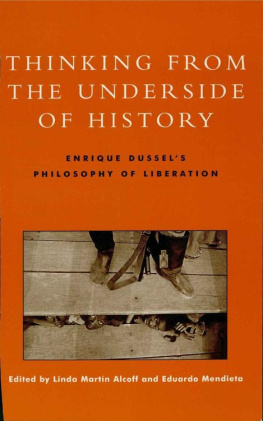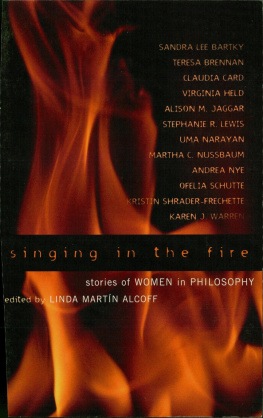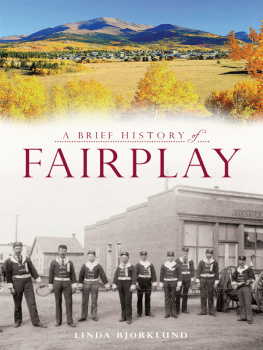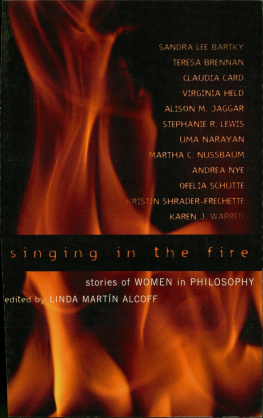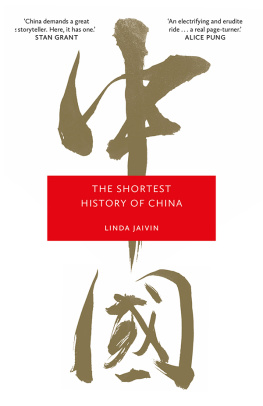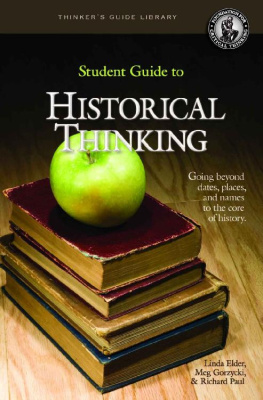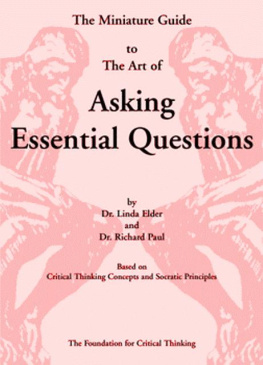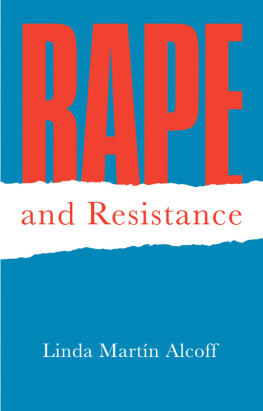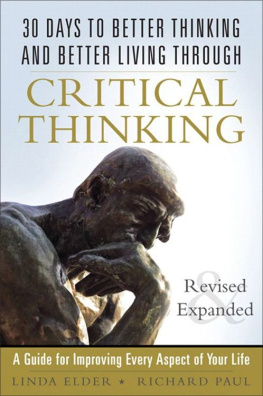Linda Alcoff - Thinking from the Underside of History
Here you can read online Linda Alcoff - Thinking from the Underside of History full text of the book (entire story) in english for free. Download pdf and epub, get meaning, cover and reviews about this ebook. year: 2000, publisher: Rowman & Littlefield Publishers, genre: Religion. Description of the work, (preface) as well as reviews are available. Best literature library LitArk.com created for fans of good reading and offers a wide selection of genres:
Romance novel
Science fiction
Adventure
Detective
Science
History
Home and family
Prose
Art
Politics
Computer
Non-fiction
Religion
Business
Children
Humor
Choose a favorite category and find really read worthwhile books. Enjoy immersion in the world of imagination, feel the emotions of the characters or learn something new for yourself, make an fascinating discovery.
- Book:Thinking from the Underside of History
- Author:
- Publisher:Rowman & Littlefield Publishers
- Genre:
- Year:2000
- Rating:4 / 5
- Favourites:Add to favourites
- Your mark:
- 80
- 1
- 2
- 3
- 4
- 5
Thinking from the Underside of History: summary, description and annotation
We offer to read an annotation, description, summary or preface (depends on what the author of the book "Thinking from the Underside of History" wrote himself). If you haven't found the necessary information about the book — write in the comments, we will try to find it.
Thinking from the Underside of History — read online for free the complete book (whole text) full work
Below is the text of the book, divided by pages. System saving the place of the last page read, allows you to conveniently read the book "Thinking from the Underside of History" online for free, without having to search again every time where you left off. Put a bookmark, and you can go to the page where you finished reading at any time.
Font size:
Interval:
Bookmark:

ROWMAN & LITTLEFIELD PUBLISHERS, INC.
Published in the United States of America
by Rowman & Littlefield Publishers, Inc.
4720 Boston Way, Lanham, Maryland 20706
http://www.rowmanlittlefield.com
12 Hids Copse Road
Cumnor Hill, Oxford OX2 9JJ, England
Copyright 2000 by Rowman & Littlefield Publishers, Inc.
All rights reserved . No part of this publication may be reproduced, stored in a retrieval system, or transmitted in any form or by any means, electronic, mechanical, photocopying, recording, or otherwise, without the prior permission of the publisher.
British Library Cataloguing in Publication Information Available
Library of Congress Cataloging-in-Publication Data
Thinking from the underside of history: Enrique Dussels Philosophy of liberation / edited by Linda Martn Alcoff and Eduardo Mendieta. p. cm.
Includes bibliographical references and index.
9781461666677
B 1034.D874 T45 2000
199.82dc21
00-024820
Printed in the United States of America
 The paper used in this publication meets the minimum requirements of American National Standard for Information SciencesPermanence of Paper for Printed Library Materials, ANSI/NISO Z39.481992.
The paper used in this publication meets the minimum requirements of American National Standard for Information SciencesPermanence of Paper for Printed Library Materials, ANSI/NISO Z39.481992.
T his book would not have been possible without the faith and support of our contributors, who trusted our ambition and cooperated unselfishly with our editorial requests and timetables. Nor would it have been possible without the encouragement, assistance, and energizing faith of Maureen MacGrogan. We owe her. We are also very grateful to our respective families for their patience, love, and support. We would like to acknowledge the support of the Faculty Development Fund at the University of San Francisco, which granted funds to pay for some of the translations. The Center for Latino Studies in the Americas (CELASA) at USF also provided logistical and research support. Eduardo would like to especially thank his assistant Martin Woessner for his dedication beyond the call of duty, eagle eye when proofreading, and cheery devotion to Heidegger and the deconstruction of Western metaphysics; also Annemarie Belda for her patience and wisdom in regard to the latest versions of word processing programs. We thank Jean-Pierre Ruz, editor of the Journal of Hispanic/Latino Theology, for permission to reprint a modified version of Hans Schelkshorns essay, and Ral Fornet-Betancourt for granting us translation rights to Karl-Otto Apels essay on Dussel. Most of all, we are grateful to Enrique Dussel for his hospitality, his willingness to engage with serious disagreements, and his substantive suggestions all along the way. This book is dedicated to him and to the project of overcoming Euro-centrism in philosophical thought, toward which he has made such a critical contribution.
Linda Martn Alcoff
Syracuse, New York
Eduardo Mendieta
San Francisco, California
Linda Martin Alcoff and Eduardo Mendieta
N ot so long ago Western societies claimed the name modernity for their time, their contemporaneity, assuming this to be at the forefront of the historical continuum. Modernity was a self-description that served as a self-affirmation, differentiating the West from the rest. Today, modernity has given way to globalization, or the global age, as a way to describe societies, though not merely or necessarily those of the industrialized West. Already there is a highly developed bibliography of materials seeking to explain how globalization came to pass and what its implications are for different types of societies. One thing is clear, however: globalization has made it extremely difficult to make naive universalizing claims, just as it has also made it significantly easier, if not de rigeur, to qualify ones pronouncements with a specifying prefix: European, Indian, Asian, African, Hispanic, North Atlantic, Pacific, and so on. Ronald Robertson has nicely defined this dialectic: Its [globalizations] central dynamic involves the twofold process of the particularization of the universal and the universalization of the particular. Such is the case with Latin American philosophy.
The project to develop a Latin American philosophy is not simply part and parcel of the construction of imaginary communities for the sake of nation-state consolidation. Nor is it merely the defensive and reactive posture assumed by those who feel the need to prove their humanity. Rather, the project to develop a Latin American philosophy is the project of overcoming the neocolonialism of Eurocentric thought, of provincializing European philosophy, and of bringing Latin American and, indeed, Third World realities to the center of critical thought, whether it is concerned with ethics, politics, epistemology, or religion. Western philosophy passes itself off as universal and disembodied, without cultural roots or limitations. This is its own self-deception, for which the concept of modernity provided the alibi. Philosophies born elsewhere, from the underside of modernity, are rewriting this historical self-understanding of European philosophy as well as the telos of global thought. Latin American philosophy has the potential, then, to claim universal significance, even while it has a self-avowed cultural location, through its advanced critical consciousness. It is by no means alone in this critical marginality to dominant Eurocentric thought, but what Latin American thought in particular has to contribute is its thorough knowledge of and engagement with the founding moment of Europe itself: the encuentro , or encounter, between two worlds, one old, the other new.
No one has contributed more to the development of Latin American philosophy as a critical reflection on modernity and globalization in the last half of the twentieth century than the Argentine-born philosopher Enrique Dussel. Dussels life has included extensive studies of pure Western philosophy, political activism, repression and exile from a military dictatorship, a turn toward Marxism and liberation theology, and the development of the comprehensive articulation of a philosophy of liberation. Dussel has incorporated and arguably surpassed the leading critical resources of European philosophy toward this project, including the hermeneutic critique of universalism, the critique of totality in the work of Emmanuel Levinas, and the discourse ethics developed by Karl-Otto Apel and Jrgen Habermas.
Dussel insists that our primary concern must be nothing less than the ongoing global genocide. An estimated 20 million persons die each year from starvation and malnutrition perpetrated by the new world order of global capitalism. Like many African philosophers and Indian postcolonial cultural critics, Dussel is convinced that European thought is an important site at which one might interfere with the smooth reproduction of this system. In his philosophy of liberation, Dussel has sought a solution to the totalitarian thought of oppression through a recourse to what it has excluded: the perspective, and the labor, of its victims. What emerges very clearly from this approach is that liberation must be pluritopic, not mono-topic, and that it will be culturally local. Dussel calls such an approach, which revises universality by combining it with a recognition of irreducible difference, a diversality.
In this volume, North American and European philosophers interpret, debate, and attempt to come to terms with the meaning and implications of Dussels thought. The chapters here do not presume readers who are already acquainted with Dussels corpus, but they provide accessible overviews of many aspects of his ideas, from ethics to politics to religion. Walter Mignolo situates Dussel vis--vis other critical theoretical projects such as subaltern studies, and Eduardo Mendieta explains and defends Dussels approach to global ethics. Elina Vuola critiques the philosophy of liberations account of feminism and of gender, and Lynda Lange explains the resources in Dussels work for a postcolonial feminism. Roberto Goizueta defends the religious implications of Dussels ethics, while Michael Barber considers whether Dussel has reflected enough on the inevitable tensions between making theory and recognizing alterity. Both James Marsh and Hans Schelkshorn consider Dussels critiques of discourse ethics, each agreeing and disagreeing with aspects of his critique, and Karl-Otto Apel attempts to defend discourse ethics against Dussels charges. Mario Senz criticizes Dussels Levinasian interpretation of Marx, and Linda Martn Alcoff indicates how the use of some of Michel Foucaults work might help Dussel elude his critics. The final essay in the volume is Dussels response to these various engagements with his work.
Font size:
Interval:
Bookmark:
Similar books «Thinking from the Underside of History»
Look at similar books to Thinking from the Underside of History. We have selected literature similar in name and meaning in the hope of providing readers with more options to find new, interesting, not yet read works.
Discussion, reviews of the book Thinking from the Underside of History and just readers' own opinions. Leave your comments, write what you think about the work, its meaning or the main characters. Specify what exactly you liked and what you didn't like, and why you think so.

